YOU ARE NOT ALONE WITH YOUR DIAGNOSIS – THERE ARE MANY PLACES WHERE YOU CAN FIND SUPPORT
An HIV diagnosis can be a life-changing event. So if you don't know how to handle your feelings right now, that's completely normal. Remember: HIV is manageable and you can lead a completely normal life with treatment. Another bit of good news is that you can now find support and counselling at eye level everywhere in Germany - and of course trustworthy medical help from experts in the field of HIV.
Listen to Tom´s story about his diagnosis:
If you have been told you've tested positive, you'll usually be referred to an HIV specialist. These are doctors who specialise in treating people with HIV, as opposed to a general practitioner or general internist who may only care for people living with HIV every now and then. HIV specialists are therefore usually the first point of contact for your questions about HIV treatment.
When choosing the doctor who will accompany you through your HIV treatment in the future, it is important to consider: how easy it is to reach your doctor, so that you can easily keep your regular appointments and build up a personal relationship of trust.
There are HIV specialists throughout Germany.
At counselling centres, you will find competent and understanding people who can answer your questions. They will be able to give you support and advice on how to move forward, and will talk to you about what is most important for you.
The following selection of counselling options and self-help networks not ranked in any particular order. Simply choose the contact point that seems suitable for you.
German AIDS Foundation

The German AIDS Foundation (DAH) is one of the oldest AIDS and HIV organisations in Germany. It is an umbrella organisation that includes around 130 organisations and represents the interests of people with HIV or AIDS in public, as well as in the realm of politics, science and medical research. One area of focus is raising awareness about HIV and AIDS, as well as about other sexually transmitted diseases.
You can request a range of information materials directly online or receive free and anonymous advice by phone, email and chat. Of course, you can also simply make an appointment for a personal consultation at one of the regional offices throughout Germany (the "local AIDS Foundation centres").
In addition to counselling, local AIDS organisations also offer many training and social activities for people with HIV, and frequently provide various self-help groups (for example groups specifically for women or heterosexual men).
One special offer from the German AIDS Foundation is the “Buddy Project”: here, people who have recently been diagnosed with HIV have the opportunity to choose a buddy in their area. They will then provide you with advice and support. sometimes, the best person to support you is someone who has been in the same situation and understands what you are going through.
AktHIV.de
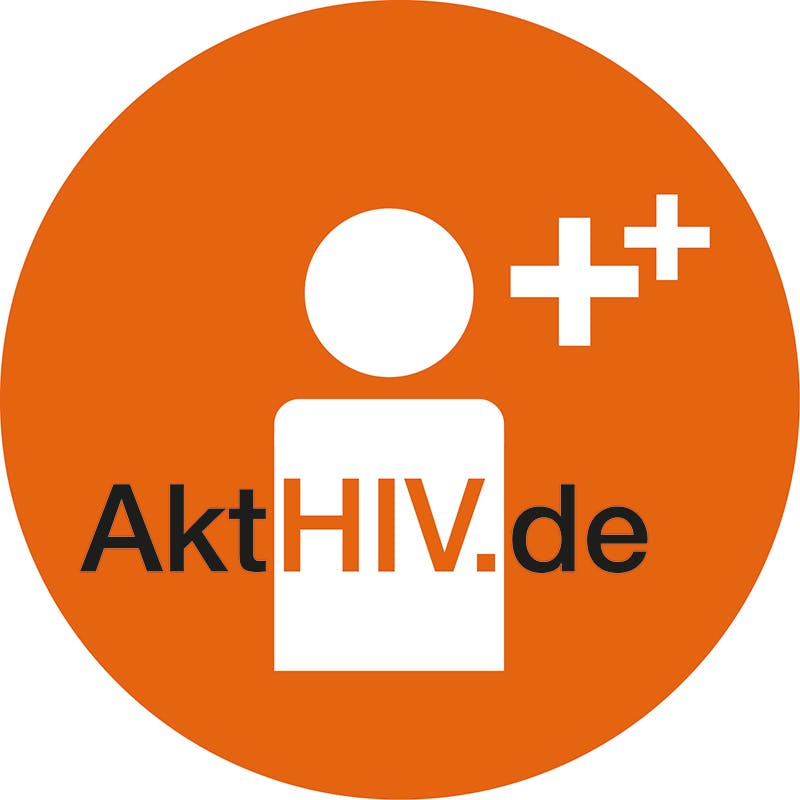
AktHIV.de is a Germany-wide independent positive network and, as an association of regional HIV self-help networks, advocates for the interests of HIV-positive people.
For more information about AktHIV.de, see here.
Regional networks
In several German states, there are various regional networks offered by and for people with HIV. The aim of these regional networks is to bring together people who want to work together to reduce discrimination and stigmatisation – regardless of whether they themselves are HIV positive or not. An example of this is the “Pro Plus” networks.
By clicking on the relevant logo you will be taken directly to the website of the corresponding network:
Positive Space
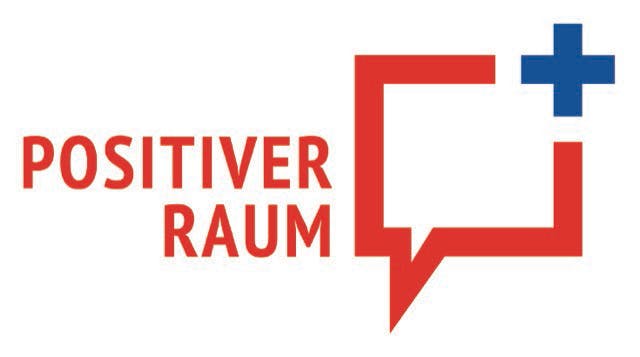
The "Positive Space" project is intended to offer people with HIV in more rural areas the same opportunities for information and mutual discourse as exist in larger cities at AIDS Foundation centres and other institutions. A safe space will be created where information evenings for HIV-positive people will take place. These evenings also offer an opportunity to exchange ideas with other participants.
Find out more here about what Positive Space offers.
FOUNDATION ACADEMY WALDSCHLÖSSCHEN
The Foundation Academy Waldschlösschen offers a wide range of events for continuing education and training, including special offers for people with HIV. This also includes regular meetings for HIV-positive people, their partners and families.
The academy offers a meeting place and is based on the belief that all people have equal rights.
Find out more here about the range of events offered by the Foundation Academy Waldschlösschen.
GSSG

The Non-Profit Foundation for Sexuality and Health (GSSG) aims to encourage a positive attitude towards sexuality and provide assistance for self-help. It particularly supports women – including those living with an HIV infection. For example, the foundation supports the "SHE programme". Its aim is to support and empower women with HIV so that they can live their lives with the HIV as well as possible, and in the most healthy way.
Find out more here about what the GSSG offers.
WHAT IS IMPORTANT TO KNOW ABOUT HIV TREATMENT AND WHY
If an HIV infection is left untreated, it usually progresses until immunodeficiency sets in and AIDS develops. HIV treatment is intended to prevent a weakening of the immune system and the resulting complications.
HIV reproduces in specific immune system cells, the CD4 cells, which are destroyed while the number of HIV in the body simultaneously undergoes a significant increase.
The aim of HIV treatment is to reduce the amount of HIV in the blood. In this context, this is referred to as "viral load" – decreasing this value to below the detection limit. That means: the number of viruses in the blood is reduced to a level where it can no longer be detected using conventional methods. If you manage to suppress HIV in this way and maintain this condition permanently, your immune system will recover and be able to work normally again.
The following figures show how the viral load (1.) and the number of CD4 cells in the immune system (2.) would develop without treatment or how they change in comparison with successful HIV treatment.
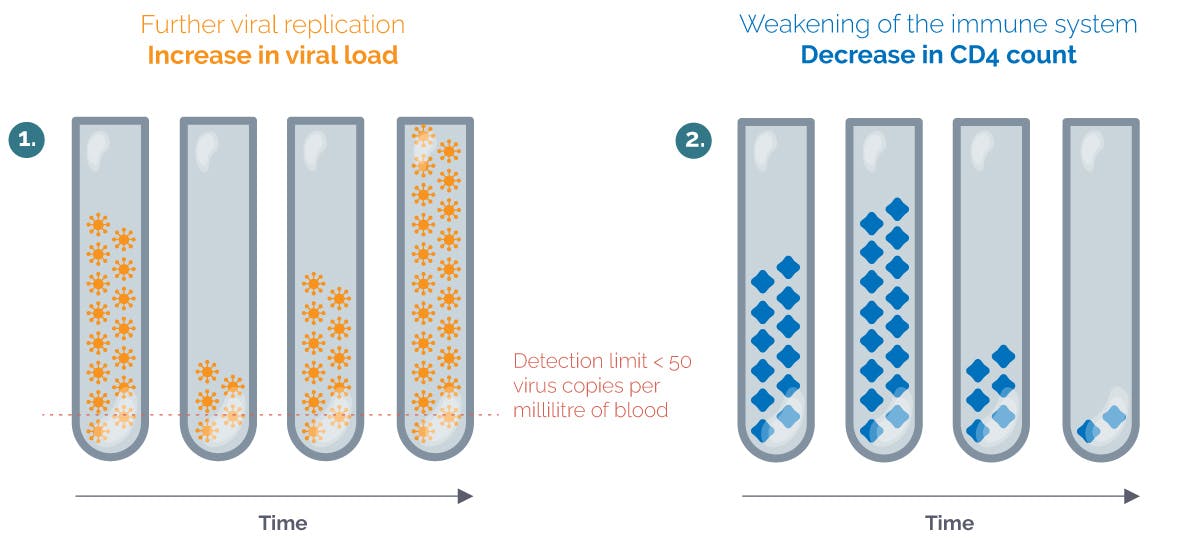
Image: Development of viral load and CD4 cell count WITHOUT HIV treatment
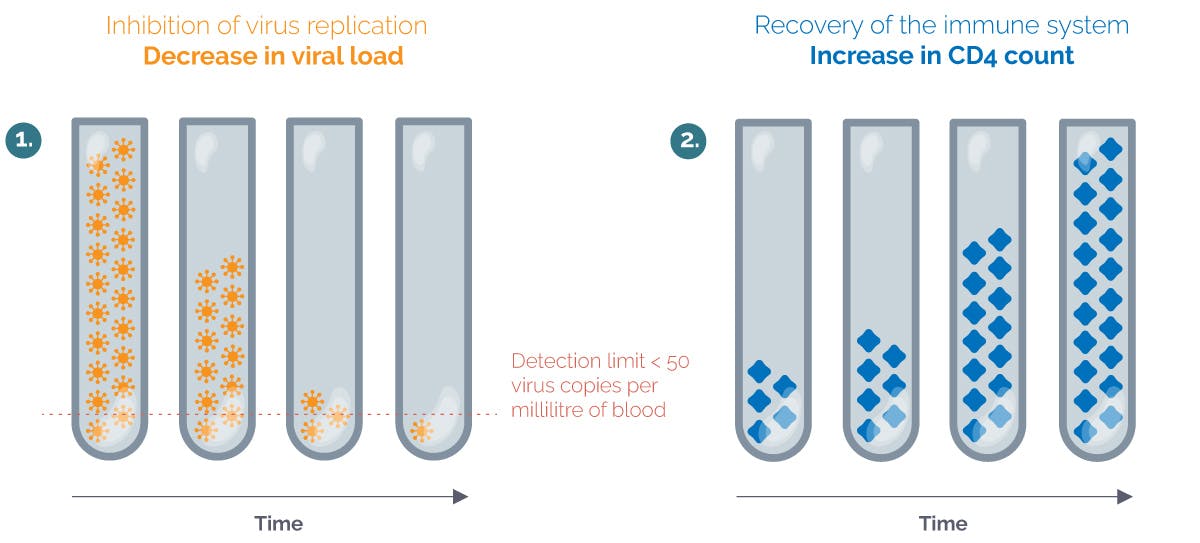
Image: Development of viral load and CD4 cell count WITH long-term HIV treatment
Since the treatment prevents the uncontrolled proliferation of viruses in your body, you can now live a long and healthy life thanks to modern treatment options – just like someone without HIV. However, for this to work, consistent adherence to treatment is important. Today’s medications are generally well tolerated and can be easily integrated into everyday life. Another important reason for starting treatment: with long-term, successful treatment and an undetectable viral load, HIV is not no longer transmissible – even during condomless sex.1, 2
The first point of contact for treatment is your HIV-focused practice. Here, your doctor will not only give you professional advice on what treatment might look like and which treatment best suits your situation, but you will also learn what HIV treatment means for you and your long-term health.
This information and, above all, open conversatins with your doctor before starting treatment can settle your fears and therefore make a significant contribution to relieving any anxiety or stress. Before your first appointment with your specialist, it is best to make a few notes (for example, what questions you have about the treatment) and take them with you to the visit.
If you are HIV positive, you should start treatment as soon as possible. This gives your immune system a chance to recover quickly, so that long-term complications of the infection can be avoided.
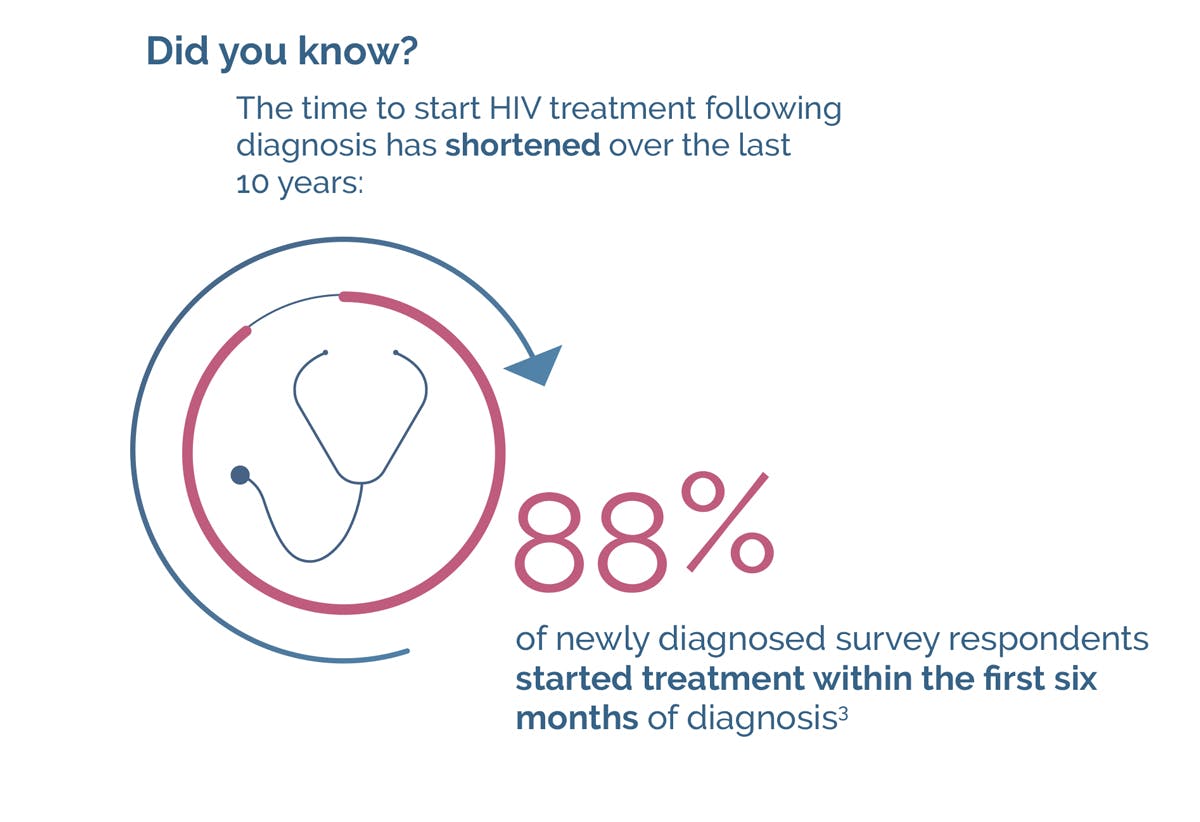
Before you begin treatment, it is important that you discuss all your questions and concerns with your HIV specialist. In this way, you can resolve any issues you may have in advance in a satisfactory manner. This will help you feel safe and you can be well informed before you start your HIV treatment. Of course, you can also seek advice from other contact points like from local AIDS Foundation organisations or other HIV counselling centres.
The treatment itself is always prescribed by specialised practices or outpatient clinics. You can find out where to find a suitable practice or outpatient clinic in your area at local AIDS Foundation organizations or on the DAGNÄ website (German Association of General Practitioners Caring for HIV-Infected Patients).
HIV treatment infection usually involves taking tablets. Since effective HIV treatment often involves combining active substances together in one medication (known as combinations), it is often possible to take a single tablet once a day. While some people manage well with a daily tablet, for others, treatment by means of a regular injection may be the better solution. It is best to talk to your doctor about the different options. It is important that your HIV treatment suits you and your needs and that you can easily integrate it into your daily routine. This is so that you can continue living a normal life. You don’t need to worry about the money either: in Germany, the costs of your HIV treatment are covered by your health insurance.
It sounds simple, and in principle, it is. However, there are a few things to keep in mind:
- Remember to take or use your medication regularly
The first and most important point is: Remember to take your tablets every day. The tablets should be taken at the same time of day if possible, so that the active substance levels of the medication in your blood always remain constant.
As well as HIV treatment in tablet form, there are also special HIV medicines that are given by other means, for example, by subcutaneous or intramuscular injection, or by infusion into a vein. Even with these forms of HIV treatment, regular administration is important to keep the active substance levels in the body constant. That means: the timing of the injection or the regular appointments for the infusion must be strictly observed. Not all of the forms of treatment mentioned here are available in Germany, so it is best to speak to your doctor directly about this.
For more information on the importance of continuing HIV treatment, see the section "Why the medication should be taken regularly".
Which form of HIV treatment is right for you—daily tablets or treatment with a regular injection—ultimately depends on your personal situation. Talk to your doctor about this. They can explain the relevant advantages and disadvantages, necessities and requirements in detail and help you make the right choice for you.
- Adhere to the dosage instructions and watch for drug interactions
In addition to regular intake or use of HIV treatment, there may be specific instructions for use depending on the medication. For example, some medications must be taken with a meal. Some HIV medications are incompatible with certain other medications, nutritional supplements or the use of recreational drugs. This is when we refer to "drug interactions“.
Speak to your doctor or pharmacist openly about what else you are taking. Don't worry, doctors are of course also bound by the obligation to maintain medical confidentiality when discussing topics, such as substance use. Of course, you can also read the information about possible interactions in the package leaflet. However, you will find that a personal conversation with your doctor or pharmacist is much easier.
- Attend check-ups with the doctor
To ensure that HIV treatment remains successful over the long-term and that you cope well with it, it is important to have the effectiveness and tolerability of the treatment checked regularly. To do this, visit your HIV specialist and have your blood drawn, which is then examined in the laboratory. You will usually also provide a urine sample at the medical practice.
When examining your blood and urine samples, in addition to the viral load (that is, the amount of HIV in the blood), other important values will also be checked. If everything is OK, you can simply continue with your HIV treatment as before.
It is important to always make sure that you continue your HIV treatment. If you are taking tablets as treatment and you notice that your tablets are running low between two check-up appointments, you should request a new prescription in good time. This way, you will always have enough medication at home and avoid unplanned interruptions in treatment (for example, running out of medication over the weekend or on holiday). If you are receiving treatment with injections, you should always make an appointment for the next injection at each injection appointment. This way, you will not forget
Appointments with your doctor will always follow a similar pattern. You can decide whether you want to talk to your doctor after the blood test, for example. It is a good idea to take advantage of this opportunity regularly, especially at the beginning of treatment, because this is where you can ask any questions and address possible side effects or difficulties with taking your treatment. You and your doctor work as a team to find the best solution for you.
You can find more information about appointments with your doctor in the section “Talking to the doctor".
Various laboratory values play an important role in the treatment of your HIV infection. To determine these values, your doctor will take blood samples regularly and may also ask you for a urine sample. Based on the results of these laboratory tests, your doctor can then assess, for examplethe amount of virus particles in your blood (viral load) and how well your immune system is functioning (CD4 count) However, other laboratory values, such as the "full blood count or FBC ", are also informative for your doctor and help to keep a close eye on your general health.
When you have blood tests as part of your HIV treatment, two laboratory values are particularly important:
The viral load
This refers to the amount of HIV in the blood. The viral load is measured by the number of virus copies per millilitre of blood plasma; your doctor speaks of "HIV-1-RNA copies/mL". The value at which the viral load is considered "below the detection limit" has been set at 50 copies/mL. For further explanations, see the section "Viral load and detection limit".
The T helper cells
The T helper cells (also called CD4 cells ) play an important role in controlling the body's own defences. The number of helper cells per microlitre of blood is measured; in short, this is called "CD4 cells/µL". For more detailed explanations, see the section "Target cells".
You can see the trends for the two laboratory tests in an untreated HIV infection and how they change over time in comparison to successful treatment here.
If HIV is successfully suppressed by appropriate treatment, the viral load decreases and the number of CD4 cells increase again, allowing the immune system to recover. As you can see, the viral load and the number of (CD4 cells) are closely related. That's why the number of CD4 cells in your blood is checked regularly to measure your immune system.
In any case, the following applies: If – and only if – the treatment is taken consistently and is not interrupted, the viral load remains low; normally, after some time the viruses in your blood will be very low levels below the limits of detection with normal tests or undetectable. Stopping treatment, on the other hand, leads to an increase in the viral load and a decrease in CD4 cells, which can ultimately result in your immune system becoming weaker.
- Even during successful treatment, "blips" can occur. A blip is a short-term increase in the viral load to values of up to 200 virus copies/mL. However, this is no reason to worry, because such a blip is neither an indication of treatment failure nor that HIV can be transmitted again. Nevertheless, in the event of such a short-term increase, the viral load should be checked again after one month to ensure that there is no trend towards a further increase in the viral load.
Although the viral load and the number of CD4 cells are the two most important laboratory values that your doctor will examine during regular check-ups, there are others as well. Some laboratory values are determined by testing your blood, others are determined using a urine sample.
A brief description of the other important laboratory values can be found in the following table:
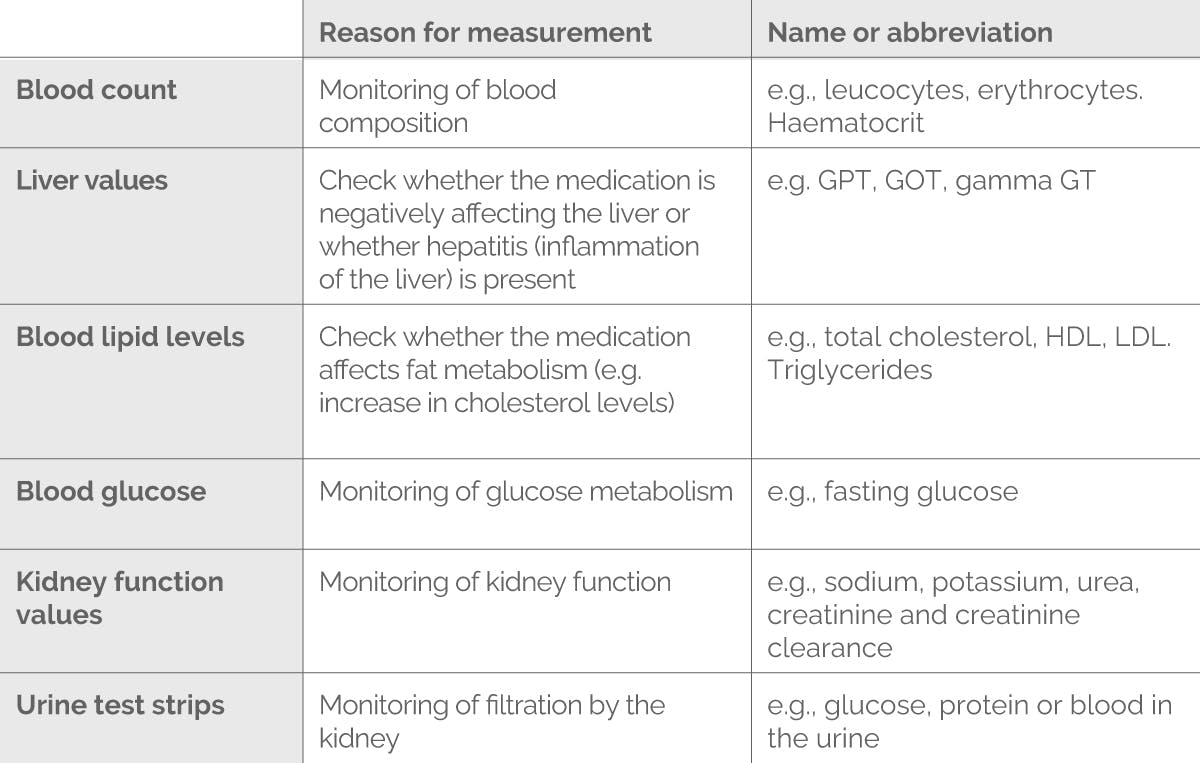
This list is only a selection. Your doctor may determine additional values as part of the laboratory analysis. If you are concerned about certain blood values or would like to know more precisely what a value means, just talk to your doctor about it.
THE DIFFERENT CLASSES OF ACTIVE SUBSTANCES AND WHAT MAKES THEM SPECIAL
As shown in more detail in the section "Course of the infections" more precisely, HIV infects human immune cells. The virus inserts its genetic material (viral RNA) into the cell's genetic material, causing it to produce more copies of the virus. Such viruses, which are capable of incorporating their genetic material into foreign cells, are called "retroviruses" – and the treatment against these viruses is therefore called "antiretroviral Treatment" or, for short, ART.
- The aim of antiretroviral treatment is to reduce the multiplication of viruses and therefore their quantity in the body (also known as the "viral load") to the lowest possible level – ideally so low that HIV in the blood is no longer detectable.
If you talk to your doctor, you will learn that HIV treatment always involves different active substances combined with one another to prevent the virus from multiplying in different places. This multi-pronged attack means that the virus cannot escape regular, effective treatment and cannot develop resistance to the medication.
While at least three or four active substances were combined for this treatment, which targets several points simultaneously, from the mid-1990s onwards, the German guidelines for HIV treatment today4 —which doctors use as a guide when selecting treatment—also recommend modern combinations with two active substances. You can read more about this in the section "Advances in HIV medications".
The medications used today are usually so-called combination preparations: This means that one tablet contains several different active substances. This means that a treatment based on several active substances can be carried out with just one tablet a day.
Most of the active substances are taken daily with a tablet, but there are also active substances that are administered either as a subcutaneous or intramuscular injection or as an infusion into a vein. However, not all of the forms of treatment mentioned here are available in Germany. It is best to talk to your doctor to find the treatment that best suits you and your situation.
The active substances used in HIV treatment can be divided into different "active substance classes". This categorisation is based on the point in the replication cycle of the HIV virus at which the active substances are used to block its replication.
The different active substances can basically target three main areas in the life cycle of HIV:
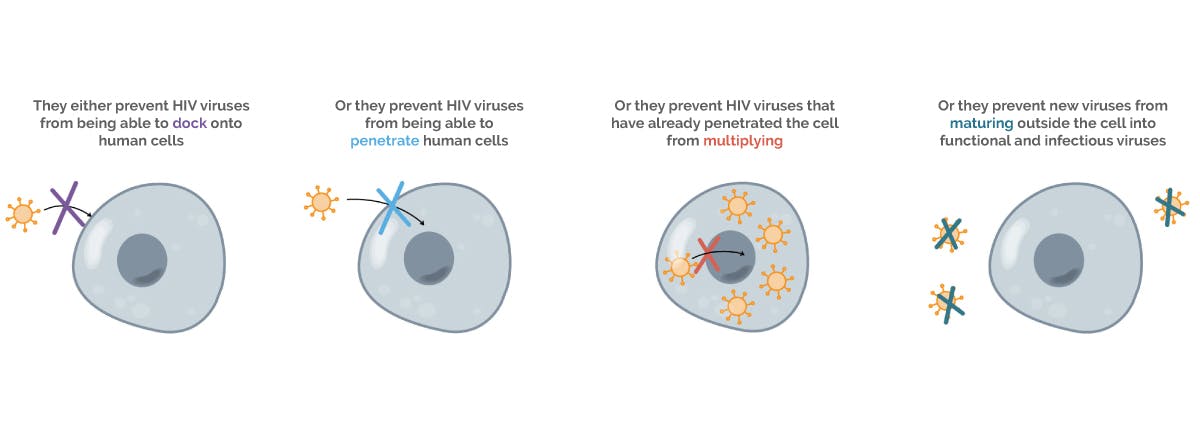
Image: Depiction of the main targets of HIV medications
The following diagram provides an overview of the classes of active substances currently available for HIV treatment and the point in the HIV replication cycle at which they are used:
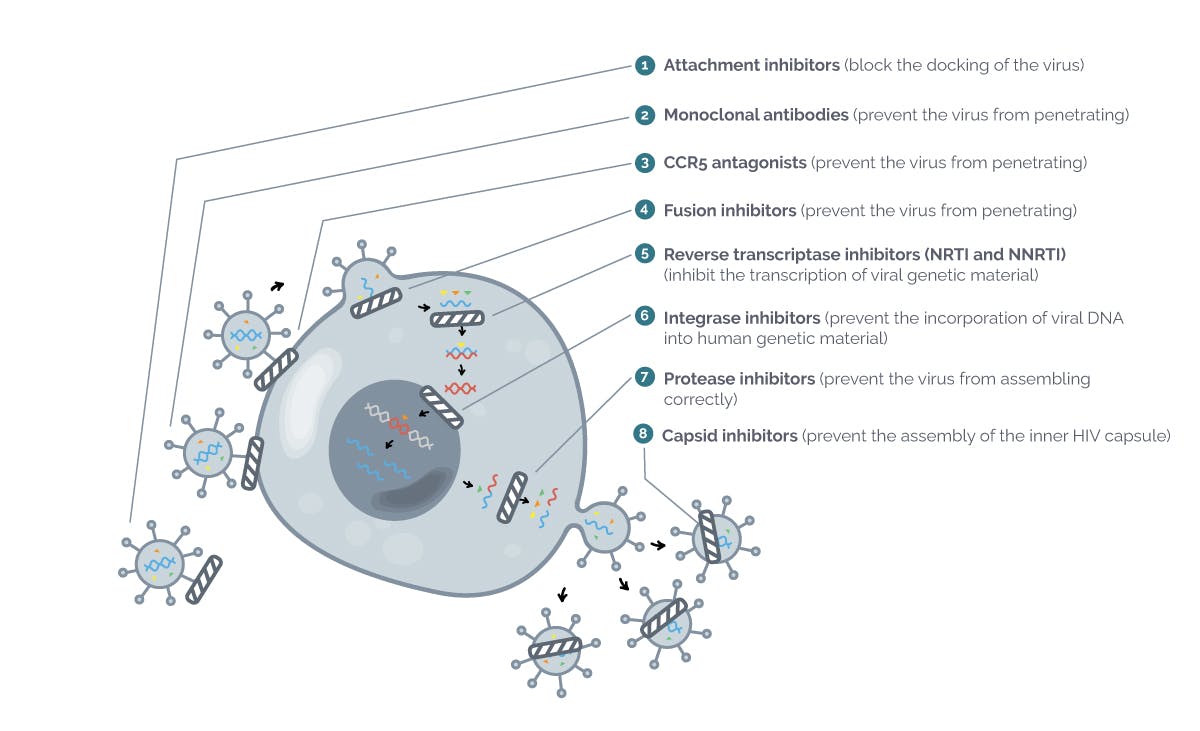
Image: Depiction of the attack points of the different classes of active substances in the replication cycle of HIV
Do you want to know more about the names of the individual active substances, how they are combined in HIV medications and how they are administered? In the following sections you will find more detailed explanations of the different classes of active substances and the individual active substances.
Active substances that prevent the HIV from docking onto the CD4 cell and thus ensure that the virus cannot infect this cell are called attachment inhibitors. The term "inhibitors" is another word for "blockers", i.e. active substances that block a developmental step of the virus.
Attachment inhibitors: The virus has docking sites on its outer surface that it needs to bind to the receptors on a human cell. Attachment inhibitors cover the docking sites on the virus and block them while the virus is still "swimming" freely in the blood. This prevents the virus from docking onto the CD4 cell and infecting it. At present, there is only one member of the class of binding inhibitors among the various drugs used to treat HIV.

Active substances that prevent the virus from penetrating the human cell are often referred to as entry inhibitors. In addition to the entry inhibitors described below, there are newer drugs that prevent HIV from entering human cells, called monoclonal antibodies.
Monoclonal antibodies: These are artificially produced antibodies that specifically bind to a certain surface structure on the CD4 cell and therefore prevent the virus from entering the cell after docking. To date, there is only one representative from the class of monoclonal antibodies among the drugs for HIV therapy.

In the group of entry inhibitors, two different classes of active substances are distinguished:
CCR5 inhibitors: They prevent HIV from binding even more tightly to the CD4 cell after docking to the cell receptors. In this way, the penetration of the virus into the cell and therefore the infection of the cell with HIV is prevented. To date, there is only one member of the class of CCR5 inhibitors for HIV treatment.

Fusion inhibitors: If HIV is already docked on the surface of the immune cell, the virus envelope usually fuses with the outer shell of the cell. This allows the virus to enter the cell. The class of active substances known as fusion inhibitors prevents precisely this fusion and therefore the penetration of the virus. So far, only one active substance has been developed from this class of active substances.

There are also different classes of active substances that prevent HIV from multiplying after entering the cell. These act on three different enzymes that the virus introduces into the immune cell as tools for its replication.
Reverse transcriptase inhibitors: In order for HIV to multiply, its genetic information - the viral RNA—must be translated into the genetic information of the human CD4 cell (DNA). To do this, the virus uses a kind of tool, the “reverse transcriptase” enzyme. The two subtypes of the active substance class of reverse transcriptase inhibitors target this enzyme: the NRTI (Nucleoside reverse transcriptase inhibitors) and the NNRTI (Non-nucleoside reverse transcriptase inhibitors).
While NNRTIs directly inhibit the function of reverse transcriptase, NRTIs use a trick to interrupt the replication of the virus: when the reverse transcriptase is in the process of translating the viral genetic information (RNA) into the form of human genetic information (DNA), the NRTIs introduce incorrect building blocks (also called "analogues") into this process. This will then result in the translation process being aborted. The result is the same in both cases – NNRTI and NRTI: the multiplication of HIV is blocked.

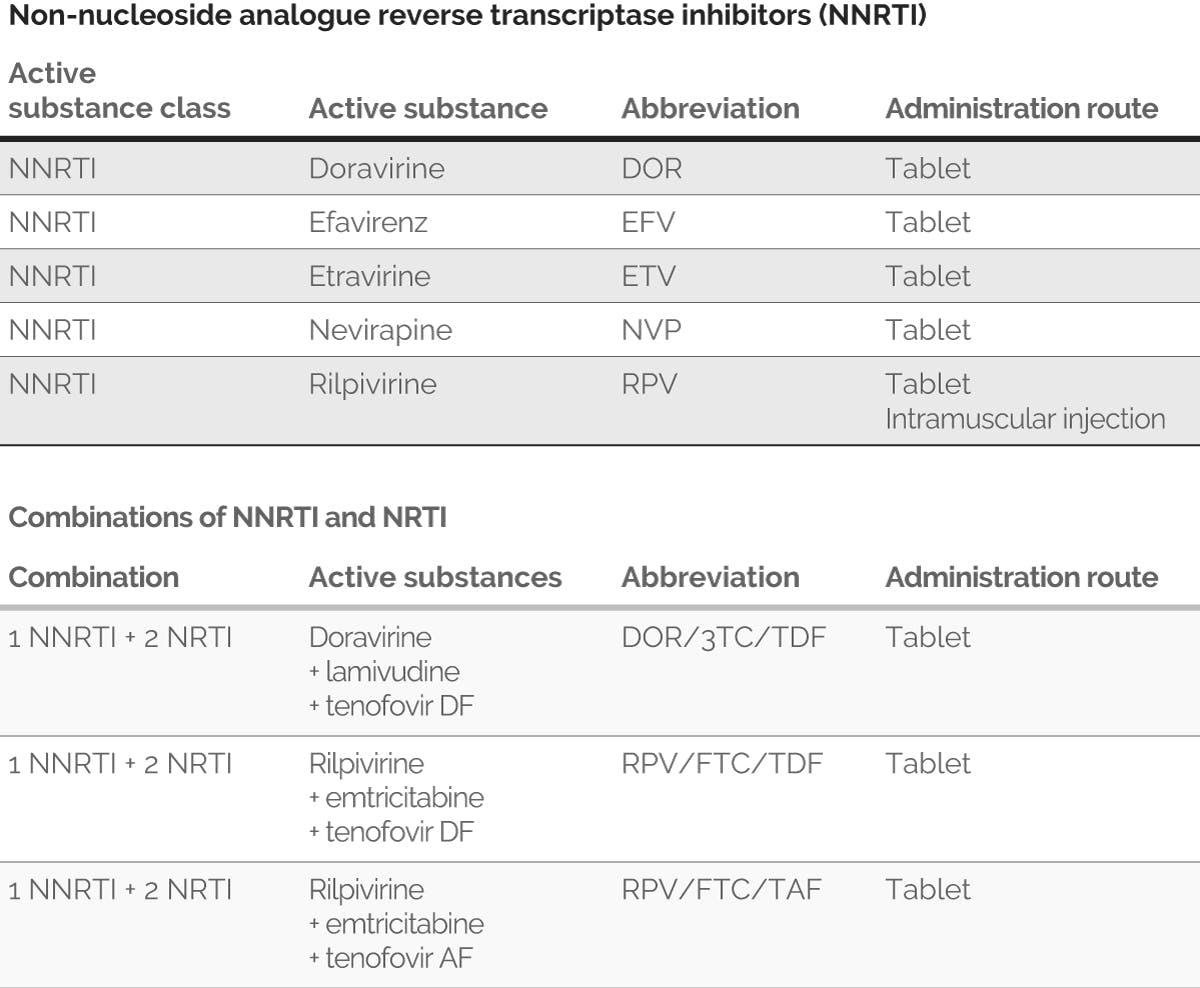
Integrase inhibitors (INI): The "integrase" enzyme is also a basic component of the HIV virus. It uses this enzyme to introduce its genetic information, which has already been translated into DNA form, into the nucleus of the immune cell and incorporate it into the human DNA. This means that the integrase inhibitors act one step later to prevent HIV from multiplying: although the virus has successfully docked onto the human cell, was able to penetrate and translate its genetic information from RNA into DNA in the cell, the integrase inhibitors now prevent the viral genetic information from being incorporated into the cellular DNA.
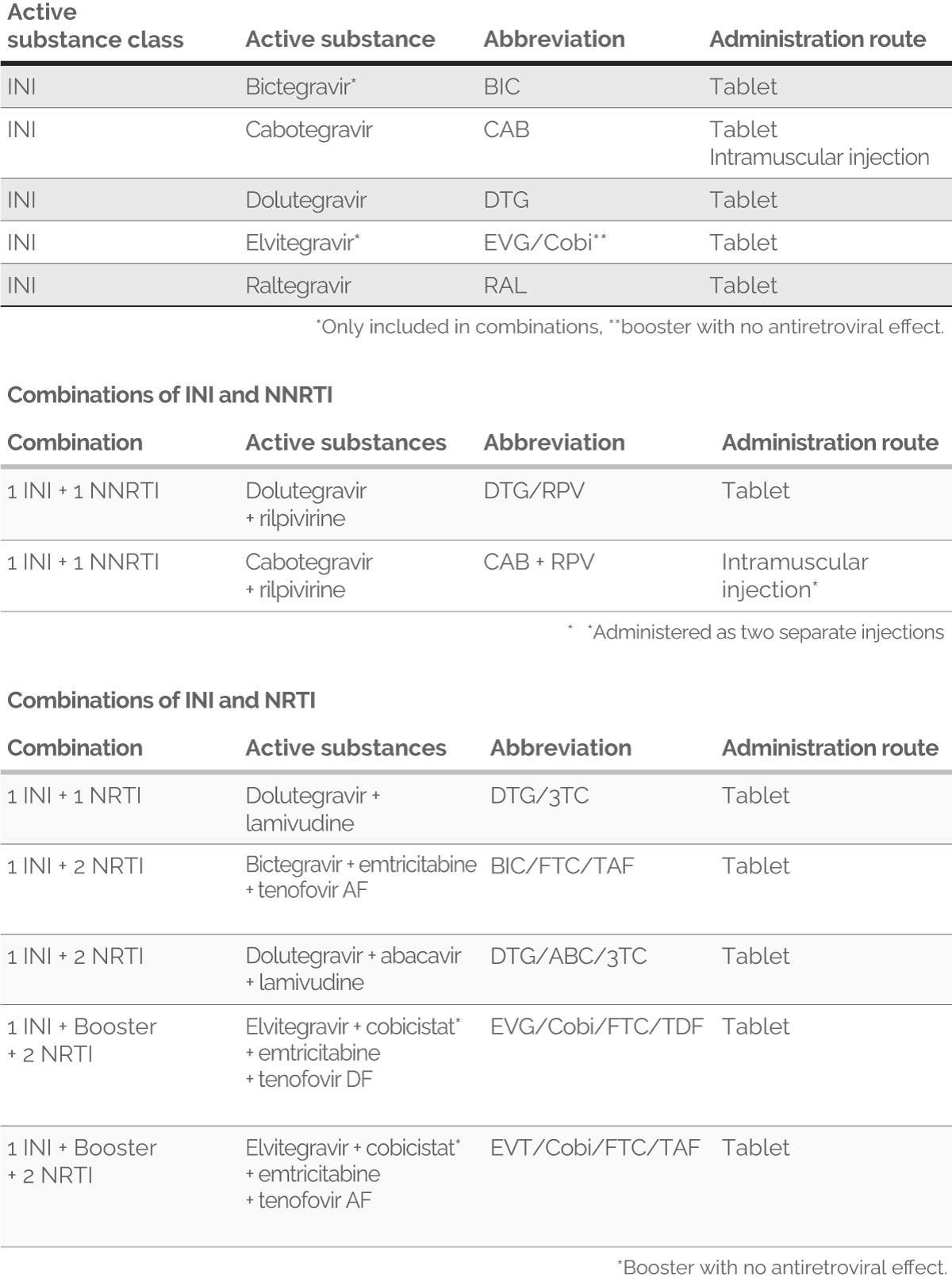
Protease inhibitors (PI): The "protease" is also an enzyme of HIV that serves as a tool in its replication cycle. After the incorporation of the viral genetic information into the DNA of the CD4 cell as described in the previous section (integrase inhibitors), new viral building blocks can now be produced. With the help of the protease, these building blocks are assembled within the cell to form functional new viruses. The protease inhibitors prevent this assembly of the individual building blocks and therefore the production of new viruses. This is where they start the last step of virus replication: the virus has penetrated the human cell and permanently infected it by incorporating its genetic material, but it is no longer able to produce new viruses.
In order to achieve a higher concentration of active substances in the blood, protease inhibitors are always given in combination with a booster. Boosters may also increase the active substance concentration of other medications (non-HIV medications, recreational drugs and, for example, St. John's Wort) in the blood.
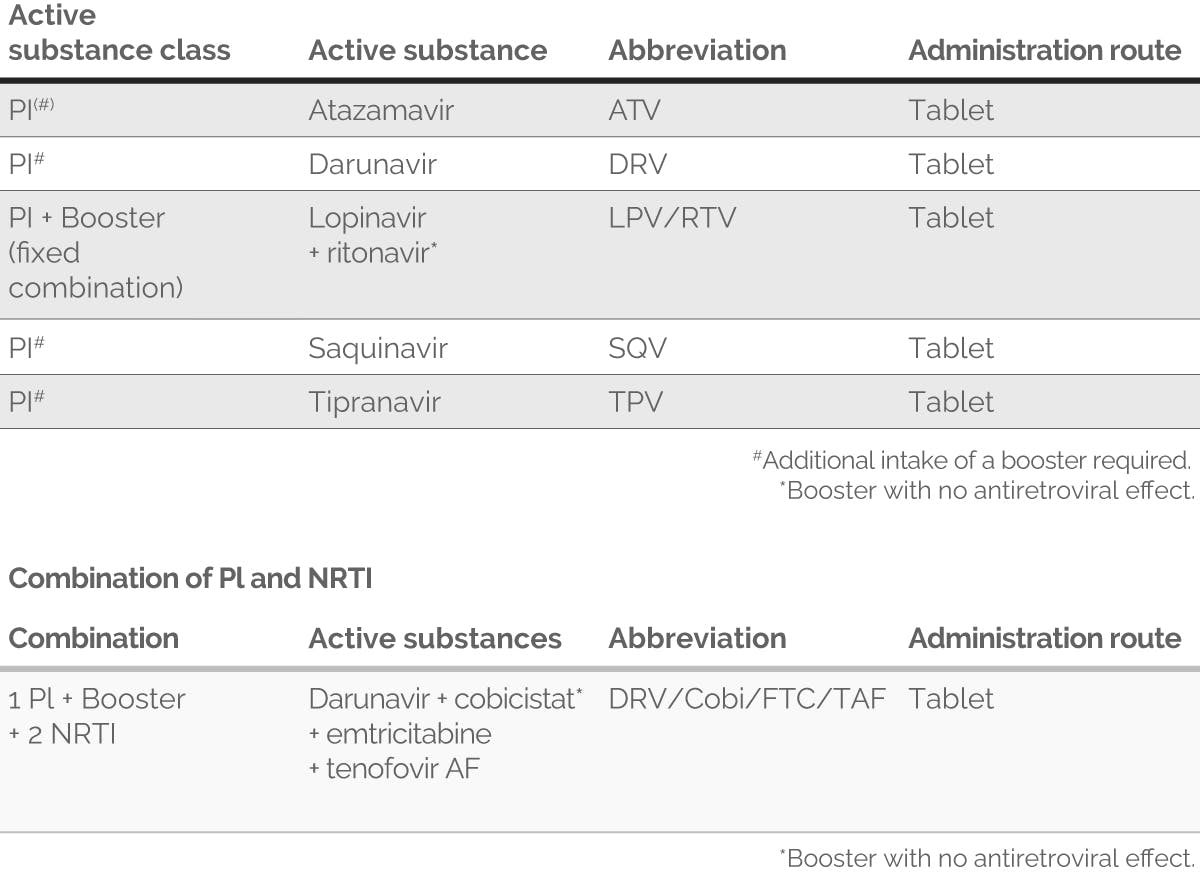
There are also active substances that prevent new viruses from maturing into functional and infectious viruses outside the cell. Currently there is only one class of active substances: the capsid inhibitors.
Capsid inhibitors: They prevent the assembly of the capsid within the virus. The capsid is a part of the HIV virus that contains the genetic information and certain enzymes that are important for the further replication of the virus. To date, there is only one representative of the capsid inhibitor class among the various active substances for HIV therapy.

A lot has happened in drug research and development since the discovery of HIV. The first medications developed to treat HIV infection were associated with significant side effects and required a variety of different tablets to be taken on a tight schedule.
Due to the development of ever more effective drugs, today's modern HIV medicines can hardly be compared with those of the past in terms of their efficacy and tolerability. Nowadays, the entire HIV treatment can often be just one tablet a day. The number of active substances required for a complete HIV therapy has also been further reduced in recent years, which can be advantageous in terms of the risk of drug interactions and possible adverse effects. Newer forms of treatment, such as the administration of long-acting drugs by intramuscular injection or as an infusion into a vein, may also offer a suitable option for some people with HIV, depending on the availability of therapies and individual suitability. Knowing about these different treatment options is very important, as it allows you to choose the one that best suits your life together with your doctor and makes HIV a smaller part of your everyday life.
In total, over 30 different active substances and medications are now available for the treatment of HIV. Most people with HIV take only one tablet a day. Thanks to the wide range of modern treatment options, an individually suitable treatment can be found for almost everyone. If you are not tolerating your HIV medication or if it does not fit into your personal daily routine, talk to your doctor: In most cases there is an alternative.
The enormous advances and improvements in HIV treatment have enabled HIV-positive people to live normal and long lives, and HIV is becoming less and less of a burden on their lives. Thanks to modern treatment options, it is now generally easy to treat HIV infections effectively and therefore prevent AIDS from developing.
And even if the HIV infection is already well advanced – i.e. symptoms of AIDS are already present – starting and consistently continuing HIV treatment can ensure that the progression of the disease is stopped, and the immune system can recover. With successful treatment, people with HIV are able to conceive and give birth to HIV negative children naturally.
You can find out more in the section "Pregnancy".
Modern HIV medications are generally well tolerated. However, as with all medicines, undesirable effects—commonly referred to as side effects—can occur. It is important to know that at the beginning of HIV treatment, the body and metabolism need some time to get used to it and adjust. However, don’t worry: if undesirable effects occur, they may disappear after a short period of time. Otherwise, they can usually be treated well or resolved by changing medication in consultation with your doctor.
There is now a wide range of treatment options available for HIV. How medications are tolerated varies from individual to individual. That's why it's important to talk openly with your doctor if your HIV treatment has side effects that bother or stress you. This is also the case if you are not happy with your current treatment for other reasons, for example, if you often forget to take your medicines or have other problems with your medicines. An open discussion about these points offers you the opportunity to find a treatment that is better suited to you.
- Particularly when starting HIV treatment or changing medication, it is important to pay attention to the signals your body is sending you, so that you can recognise any changes quickly and keep a close eye on how things are going. If you notice any changes, talk to your doctor about them!
Any side effects that you may experience will vary from medication to medication. You can also find important information in this regard in the relevant medication package leaflets. However, it is even better to have a personal conversation with your doctor. If you have any concerns about side effects or feel worried, talk about them openly. Your doctor will be able to assess the likelihood of possible side effects and weigh up the benefits and risks of the medicine with you. This way you can make the best decision to improve your quality of life.
It is important that you talk to each other regularly and openly at the beginning of treatment (but also later) in order to find a treatment that you feel comfortable with and that fits your current life circumstances. These also change over the course of a lifetime and at some point you might decide to change medications, for example, because you suddenly change work shifts and can no longer take your tablets at the usual time. HIV treatment is a lifelong process and should always be tailored to your personal needs and circumstances.
In general, there are two different types of side effects that may occur during HIV treatment: acute side effects and long-term side effects.
Acute side effects may occur in the first few weeks of taking the medication. If you notice anything unusual shortly after starting treatment or after switching to new medication, please contact your doctor as soon as possible to discuss it. Please do not stop taking your medication under any circumstances!
Most of the side effects that occur during HIV treatment are easily treated. In some cases, you might just need to change the time you take your pill, in consultation with your doctor, in order to reduce or even completely eliminate side effects.
As acute side effects tend to occur in the first few weeks of treatment or after a change of medication, it is a good idea to tell your doctor in advance if you are facing a specific situation or challenge in your life - for example, at university or at work. You can then decide together with your doctor when to change your treatment so that the two situations do not require your attention at the same time.
Long-term side effects can occur even after months or years and, depending on the medication, can affect metabolic function, organ function, bone structure, libido or sexual function.
It is often not easy to assess whether symptoms that occur are actually directly attributable to adverse effects of HIV medications. Some complaints may also be caused by other factors, such as psychological stress resulting from an HIV infection, along with consumption of nicotine, alcohol and substances (such as recreational drugs) or with mental health concerns.
In any case, your doctor is the right person to talk to if you feel that your HIV treatment is causing you problems. He or she can best assess whether your problems are actually caused by the medication and how you can be helped with your symptoms.
Counteracting unwanted effects
If you experience any side effects with your HIV treatment, you should always contact your doctor directly. You can work together to find a solution to improve your symptoms. One possibility may be to switch to another medication where the observed side effect occurs less frequently or not at all. Please never stop taking the medication on your own; always consult your doctor first.
Some other alternatives include: a healthy diet, exercise and sufficient physical activity to keep you fit, which can help reduce the likelihood of adverse effects. Quitting smoking and only consuming alcohol in moderation can also have a positive effect. For more information, see the chapter "Living well with HIV".
HIV-positive people have different needs for their HIV treatment, just as they have different lifestyles. There is no one specific medication that is equally suitable for every person with HIV. While some people do well with a daily tablet, for others, treatment with a regular injection may be a better solution. That's why it's particularly important to talk openly with your doctor about your needs and expectations, your lifestyle and any changes in your life, so that together you can find the HIV treatment that is best suited to you.
Listen to Robert talk about how good adherence shouldn't be a struggle :
You can also find a range of tips on changing life circumstances in the chapter entitled "Mastering special situations".
Sometimes it can also make sense to switch from one medication to another after a while, for example if undesirable effects occur, if there is a risk of long-term side effects or if the requirements for taking the medication correctly no longer align with your lifestyle. It is also important to be able to integrate the treatment into your daily life, so that it causes as minimal restriction or distress as possible, for example, if it causes psychological distress because you feel that you need to hide HIV medication for fear of it being discovered. Don't worry, if you are below the detection limit (undetectable) and adjust your therapy for the reasons mentioned above, you can usually switch back to the previous medication if you don't tolerate the new treatment well. You and your doctor will work together to find a treatment that best suits your lifestyle and personal needs. It is important for you to be happy with your medication. More on this in the section "Adherence to treatment". The better your HIV treatment fits you and your life, the higher your perceived quality of life will be.
It is also important for your doctor to know what other medications or preparations you are taking. This includes, for example, food supplements, stimulants or recreational drugs. These may interact with your HIV medications and therefore impact their effectiveness. The fewer active substances are taken as part of HIV treatment, as well as for other concomitant diseases, or as dietary supplements, the lower the risk of possible interactions. You should tell your doctor about anything that could potentially affect your HIV medication, because only then can you adjust your HIV treatment accordingly if necessary. There is always a solution, but what is most important is an open dialogue between you.
There have been incredible scientific advances in HIV treatment in recent years and decades. Today’s medications are generally well tolerated and highly effective. However, in order for them to be as effective as possible, there is one prerequisite: they must be taken consistently and correctly. In this context, doctors speak of treatment compliance, also called "adherence".
Sure, treatment can be exhausting and sometimes even annoying. However, the success of your HIV treatment depends largely on whether you follow the instructions for taking or using your medicines correctly. Otherwise, the medications cannot work properly against HIV and this can lead to the development of resistance against certain substances in your treatment. This means that the virus in your body becomes less sensitive to your medication and defends itself against treatment.
To maintain a good quality of life in the long term, you should follow the instructions for taking your medicine. This means:
Always make sure you have enough of your medications at home. Make sure you schedule regular appointments with your doctor to get a new prescription in time.
Take your medication regularly and preferably at the same time each day.
If applicable, follow any other instructions that come with your medication (for example, taking it with a meal or not combining it with certain other medications or dietary supplements).
Nowadays, HIV treatment can be easily integrated into everyday life. There are only a few things to consider when taking the treatment correctly. It is an advantage if you know a lot about your HIV infection and your treatment, in other words, if you are an informed patient. Your doctor or one of the numerous HIV counselling centres and self-help organizations are here to help you. You can get information and support there for all your concerns.
It is particularly important to have a trusting relationship with your doctor, because it is important that you all work together. Your personal attitude towards HIV treatment also plays an important role: if you are well informed and all your questions are answered, then you will find it easier to deal with the treatment. Despite all this, it's human nature to find taking medication daily difficult under certain circumstances. Again, it helps to be open and tell your doctor if you are having problems taking your medication regularly or if you are experiencing unwanted side effects.
It is important that you know your personal needs well. The more you know about your own needs and are aware of how they change, the more clearly you can talk about them with your doctor. When your doctor understands your needs and the unique challenges in your life, you can work together to choose the treatment that best suits your current situation.
The success of your HIV treatment depends largely on taking your HIV medication regularly. There must always be a sufficient amount of the active substances (the therapeutic concentration) in your body so that they can work effectively against HIV. The course of the active substance concentration usually follows this pattern:
Shortly after administration of the medication, the concentration of the active substances in the body is at its maximum.
The drug is broken down in the body and the concentration of the active substances decreases.
It is time for the next dose so that the concentration of the active substance in the blood does not become too low.
It is important that the concentration of the medication always remains within a certain range: On the one hand, the concentration must be high enough to adequately block the proliferation of HIV; otherwise the virus can develop resistance to the medications, meaning that the treatment is no longer effective. On the other hand, the concentration of the medication must also be low enough to prevent toxic reactions from occurring. So there are two things that matter when taking the medication: consistency and regularity.
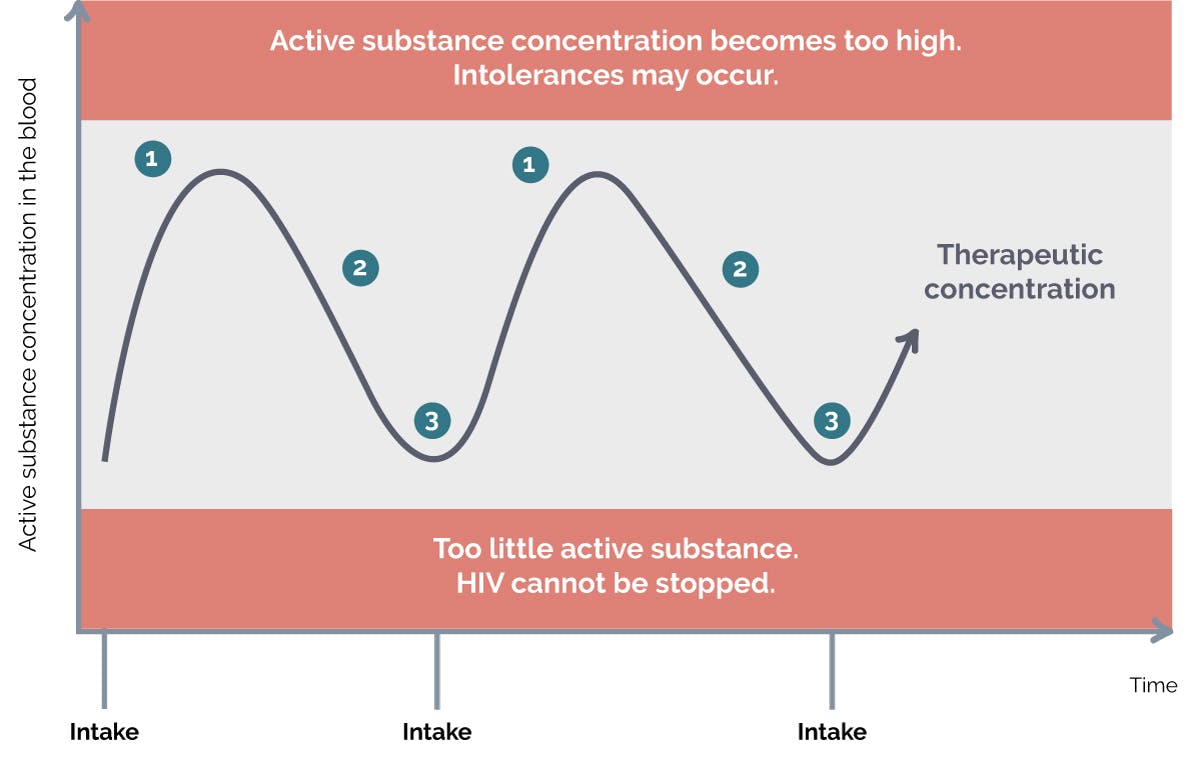
Image: Relationship between regular medication intake and maintaining the correct drug concentration
However, this does not mean, for example, that you have to take your tablets at exactly the same time every day and that the entire treatment is at risk if you miss even one of them. That would be unrealistic, because everyone forgets something sometimes. However, you should make sure that these situations are the exception and that you take your HIV medication every day at about the same time.
- If you find that you generally and consistently have difficulty taking your tablets every day, you should talk to your doctor about your difficulties. Together you can get to the bottom of the cause and find a solution.
You can also get help remembering to take your HIV medication - for example, by using the alarm function on your smartphone to remind you to take your tablets. A pill box can also help you keep track of whether you have already taken your medication today. The rule is: choose a time to take your tablets that fits well into your daily routine. This reduces the likelihood that you will forget.
Most HIV medications are taken as a tablet once a day. If you forget to do this once or if you vomited shortly after taking the medicine, you should not simply take twice the amount, because the medication may reach too high a concentration in the blood and toxic reactions may occur. You can find more information about what to do if you forget to take a dose and how long after the usual time you can take it in the package leaflet that comes with your medication.
TRUST AND OPENNESS – THIS IS IMPORTANT FOR YOUR CONVERSATION WITH THE DOCTOR
Talking openly with your doctor about any issue that could impact your HIV treatment or your current situation sometimes takes some courage. However, be sure that the people who deal with HIV on a daily basis are very respectful and sensitive towards you, your needs and your story. Everything you tell your doctor will be treated confidentially because doctors are bound by confidentiality. It is important that you are open during the conversation, because to offer you the best possible support and help in dealing with HIV treatment, the other person needs all the necessary information. And don’t worry; doctors and counsellors have heard almost everything before, so you don't have to be embarrassed.
In the following video you can see the recommendations of a doctor specialising in HIV for preparing for the conversation with your doctor:
If you can answer the following questions in advance, you will be well prepared for your visit:
- Have you been diagnosed with other diseases, such as arthritis, diabetes or high blood pressure?
- Do you take other medications occasionally or regularly? If so, please bring the packaging and information leaflets with you.
- Do you take any dietary supplements or herbal preparations?
- What is your relationship with smoking, alcohol and substances such as recreational drugs?
- What does a typical day look like for you? What is important to you in your daily routine?
- Speak openly about your experiences with treatment: Is something bothering you? Do you notice any changes in yourself?
To ensure that you don't forget anything, we recommend that you enter your appointments with your doctor in your calendar and write down any questions you would like to discuss with your doctor. It's up to you whether you prefer to use a classic paper calendar and a notepad or the calendar and memo function on your phone.
Please bring your insurance card with you to your doctor's appointment and, ideally, your vaccination certificate. The vaccination certificate is important so that your doctor can check whether your existing vaccinations still provide sufficient protection. They may also recommend that you update some of your vaccinations or have other targeted vaccinations.
How exactly does the appointment with the doctor go? First, you will give a blood sample, and you may also be asked to provide a urine sample. This means that a laboratory test can later be carried out to check how well your treatment works and how it is affecting your body, for example, with testing of your cholesterol level or your liver and kidney function. For more detailed information, see the section "What do the laboratory test results mean?".
You will then have a personal conversation with your doctor where you can talk about how you are coping with your treatment and what questions you have. These conversations are of course voluntary, but they are important and highly recommended, especially at the beginning of your treatment. If the treatment is successful and there is no reason to change anything, the conversations will probably become a little shorter over time. However, it is still important to see your doctor regularly as this is the only way they can get an idea of how you are doing in general.
You can find more detailed information on how HIV treatment works in the section "How does the treatment work?".
Remember: you and your doctor are a team. Everything you say stays in this protected space. It is therefore important to address sensitive topics during the conversation, i.e. topics that particularly concern you or that may make you a little uncomfortable at first. On the other hand, your doctor may ask you questions about very personal topics, such as your lifestyle, your sex life or your substance use. Take a relaxed approach, because the doctor is not asking you these questions out of curiosity or to embarrass you, but because he or she wants to make sure that your HIV treatment is working as well as possible and is suitable for you.
The more openly you talk to each other, the better. This applies both at the beginning and later in the course of treatment. If you feel comfortable talking, you will also be more direct and open about possible side effects or omissions in treatment (for example, if you forget to take your medication). And in the end, this is good for your own health.
References:
- Eisinger RW et al. HIV Viral Load and Transmissibility of HIV Infection: Undetectable Equals Untransmittable. JAMA 2019 Feb 5; 321(5): 451452.
- Leitlinien der European AIDS Clinical Society (EACS), Version 12.0, last updated October 2023. https://www.eacsociety.org/guidelines/eacs-guidelines/eacs-guidelines.html.
- Young et al. IDWeek 2017; San Diego, CA. Poster 1393.
- Guidelines for diagnosis and treatment of HIV infection of the German AIDS Society (DAIG). German-Austrian guidelines. Last updated September 2020. https://daignet.de/site-content/hiv-leitlinien/hiv-leitlinien
NP-DE-HVU-WCNT-250003 – February 2025







